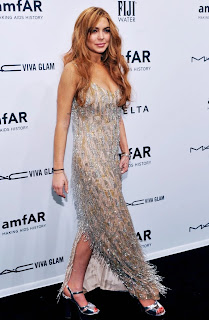Glamour (pronounced glam-er)
(1) The quality of fascinating, alluring, or attracting,
especially by a combination of charm, good looks and elegant or expensive
clothing & accessories.
(2) Excitement, adventure, and unusual activity.
(3) Magic or enchantment; spell; witchery; to enchant; to
bewitch (archaic).
(4) An item, motif, person, image that by association
improves appearance (archaic).
(5) Suggestive or full of glamour; glamorous.
(6) A kind of haze in the air, causing things to appear
different from what they really are (also used figuratively and now rare).
1710–1720: From the Scots gramarye, glamar & glamer
(magic, enchantment, spell), a dissimilated variant of the Middle English
gramere (grammar (in the sense of “occult learning”)) from The Old French
gramaire, the sense development related to the idea of magic spells cast
because occult practices were popularly associated with learning (and regarded often
with fear and suspicion); a doublet of glamoury,
gramarye, grammar and grimoire. There are suggestions the ultimate source was
Old Norse and in one dictionary of Old Icelandic there’s an entry for glám-sýni (illusion), presumed to be
from the same root as gleam. The
standard short-form is “glam” which (formerly & informally) frequently is
used as a modifier is (glam clothing, glam rock etc) as in glamour (glamour photography,
glamour party etc) and non-standard creations are common (glamourpuss, beglamour,
beglamourment, reglamoured deglamoured etc).
The Scottish sense of “magic, enchantment” was best known
in the phrase “casting the glamor” which referred to “scholarship (which could
be the possession of literacy)”, regarded as a form of the occult learning,
that idea noted also in fourteenth century English but etymologists believe it
was more common still in Medieval Latin. The words was popularized in English in
the works of Sir Walter Scott (1771-1832) and the modern sense of “magical
beauty, alluring charm” seems to have begun to evolve in the mid-nineteenth
century; by the 1930s it was most associated with the life styles of Hollywood
film stars, high-fashion & celebrity.
Danish, Dutch, Finnish, French,
German, Swedish & Norwegian (Bokmål & Norwegian Nynorsk) all adopted the spelling
used in English while the Russian was гламур (glamur) and the Catalan glamur
(Spanish picked up both the Catalan & English forms). Glamour is a noun &
verb, glamorousness is a noun, glamourise, glamourising & glamourised are
verbs, glamorous is an adjective (the spelling glamourous is now rare),
glamorously is an adverb; the noun plural is glamours.
The curious evolution of glamour is another example of the power exerted by words and their relationship to the possession of knowledge, the power elites in many societies keeping learning & knowledge exclusively in their hands. To the priests in Ancient Egypt reading & writing was “a matter of the temple” which meant that for most people they were the only source of enlightenment and men were burned at the stake for publishing the Bible in the vernacular language of the common people rather than the Greek or Latin known only to scholars and clerics. Such was the ritualism and mysticism attached to such learning that in many societies, people looked upon these skills with superstitious awe and regarded it all as the spells of magicians. Those who could read & write were said to be skilled in the “Latin grammar” and, in the way familiar as Middle English evolved the “r” changed to “l” as “r” sometimes does as language mutates. As other changes crept in, glamour was the final form and it carried over the cabalistic overtone which originally conveyed “magic charms & spells” or “occultism”. So the meanings really differ only by application and there’ still the idea of a kind of spell which might cause one to see objects in a form that differs from reality, typically to make them more desirable of beauteous.
Writing Explained tracked the pattern of use of the alternative spellings of glamour found in US & UK use (glamour is red and glamor blue).
The pattern of spelling in the US is unusual because glamour & glamor still peacefully co-exist but the latter has for decades been in decline and never really caught on elsewhere. Most US spellings make more sense that the UK originals in that they are (1) simpler & (2) more phonetic but the US preference for glamour (most sources list it as the standard US form) is not only an outlier but idiosyncratic in that the derived forms (such as glamorize) follow the conventions but deleting the pointless “u” and substituting a “z” for “s”. Etymologists suggest the creation of glamor may be a back-formation of the dropped “u” in the derived forms (glamorous the most frequently used in the US).


No comments:
Post a Comment